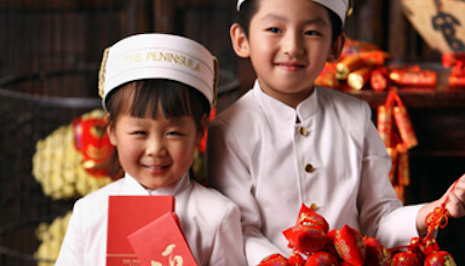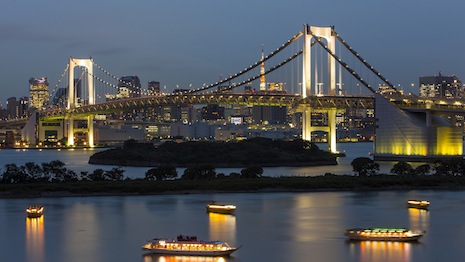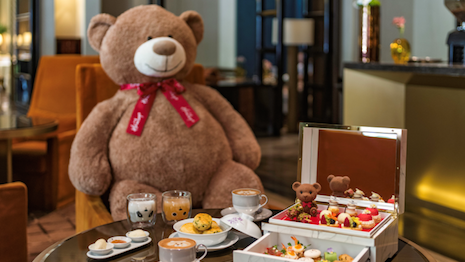 Chinese travelers seek out family-friendly destinations. Image credit: Penninsula
Chinese travelers seek out family-friendly destinations. Image credit: Penninsula
With the number of Chinese luxury travelers only expected to grow, hospitality brands need to strategize how to best appeal to these customers’ evolving habits, including their focus on family.
According to a new report by The Luxury Conversation, and commissioned by Reuter Communications, more Chinese affluents are traveling with their families than ever before. Moreover, the demands and needs of young children are having a greater impact on vacation planning with an overwhelming majority of affluent Chinese travelers allowing their children to make travel choices.
“Nowadays, Chinese parents include their children in all aspects of their luxury lifestyles, and expect the same quality, the same details, storytelling and knowledge of what they are experiencing,” said Nick Withycombe, director of content development at Reuter Communications, Shanghai.
“Besides anything ‘high quality’ and ‘international’, they want something that enriches their child and gives them new skills for their luxury lifestyles,” he said. “They want to ensure that their child is not ‘behind’ any other child, in China or globally, in terms of knowledge and experience.”
The report is based on surveys with more than 400 affluent families throughout China.
Little emperors
China's child-centric culture is influenced by its longstanding one-child policy and strong appreciation for family ties. As a result, Chinese travelers seek out destinations that offer high quality, child-friendly experiences.
According to the report "Next-Gen Luxury Travelers: Affluent Chinese Families," 95 percent of wealthy Chinese millennials will choose their next holiday based on their child’s preference – earning Chinese children the nickname "little emperors."
 Japan remains one of the most popular destinations for Chinese affluents. Image credit: Four Seasons
While about half of respondents have traveled with their children in mainland China and Hong Kong, 44.3 percent also vacationed in Japan within the last 12 months. France was the most popular destination outside of Asia-Pacific, as 28.7 percent of affluents visited the European country on family trips.
Ninety-three percent of respondents also expressed interest in taking their child on an Arctic or safari expedition, underscoring the appeal of more extreme, adventurous trips.
When choosing a hotel for a family vacation, 71.8 percent of respondents said the presence of a kids' club was a very important amenity, with the availability of a kids' menu considered to be very important by 67.6 percent of families.
This summer, Hilton's Waldorf Astoria Hotels & Resorts partnered with British toy company Hamleys to create a unique treat for children at three of its properties across China.
Together, the two companies present Afternoon Tea, a series of child-friendly events featuring toys from the esteemed toymakers at Hamleys. Waldorf Astoria will also offer parents the option to bring their children to the Kids Edutainment Club, an installation that combines fun and games with opportunities for learning (see story).
Japan remains one of the most popular destinations for Chinese affluents. Image credit: Four Seasons
While about half of respondents have traveled with their children in mainland China and Hong Kong, 44.3 percent also vacationed in Japan within the last 12 months. France was the most popular destination outside of Asia-Pacific, as 28.7 percent of affluents visited the European country on family trips.
Ninety-three percent of respondents also expressed interest in taking their child on an Arctic or safari expedition, underscoring the appeal of more extreme, adventurous trips.
When choosing a hotel for a family vacation, 71.8 percent of respondents said the presence of a kids' club was a very important amenity, with the availability of a kids' menu considered to be very important by 67.6 percent of families.
This summer, Hilton's Waldorf Astoria Hotels & Resorts partnered with British toy company Hamleys to create a unique treat for children at three of its properties across China.
Together, the two companies present Afternoon Tea, a series of child-friendly events featuring toys from the esteemed toymakers at Hamleys. Waldorf Astoria will also offer parents the option to bring their children to the Kids Edutainment Club, an installation that combines fun and games with opportunities for learning (see story).
 The project will be in place at three hotels across China. Image credit: Waldorf Astoria
As Chinese millennials start their own families, they also expect more connectivity throughout their travel.
More than fifty-four percent of respondents said it was very important to them for a hospitality brand to offer customer service via WeChat and 57.7 percent also said WeChat loyalty programs were very important. Mobile check-in is also in high demand.
Chinese travelers
As luxury marketers look to reach the valuable and growing population of Chinese outbound travelers, it is imperative for them to capture this segment's attention before they leave home since they are planners.
According to a white paper from iClick, outbound Chinese tourists’ interest in foreign independent tours and customized itineraries is growing, reaching 42 percent compared to the 44 percent of traditional packaged tours. In addition, 52 percent of these travelers plan their trips and itineraries two to six months ahead of departure (see story).
In addition, Chinese millennials' evolving travel priorities are influencing the way older generations look at leisure trips, as Chinese tourists are spending more money and visiting farther destinations than in the past.
The "2018 Chinese International Travel Monitor" by Hotels.com found that Chinese tourists of all ages are looking for more authentic travel experiences. This is impacting when, where and how they travel.
A rebounding Chinese economy means more disposable income for travelers. Chinese travelers born after 1990 spend more than a third of their income on travel, 36 percent, compared to 28 percent for Chinese travelers overall (see story).
“[Marketers] need to have a China-specific strategy – a must, but also they need to realize that their Chinese guests – leading in luxury consumption and travel – have seen it all before,” Mr. Withycombe said. “The challenge is to bring them something that no one else is doing and that realizes that their children should be ‘wowed’ as well.
“Affluent Chinese consumers have every brand, every destination, clamoring for attention,” he said. “Without a strategized, concerted and innovative effort, it’s just another brand available.”
The project will be in place at three hotels across China. Image credit: Waldorf Astoria
As Chinese millennials start their own families, they also expect more connectivity throughout their travel.
More than fifty-four percent of respondents said it was very important to them for a hospitality brand to offer customer service via WeChat and 57.7 percent also said WeChat loyalty programs were very important. Mobile check-in is also in high demand.
Chinese travelers
As luxury marketers look to reach the valuable and growing population of Chinese outbound travelers, it is imperative for them to capture this segment's attention before they leave home since they are planners.
According to a white paper from iClick, outbound Chinese tourists’ interest in foreign independent tours and customized itineraries is growing, reaching 42 percent compared to the 44 percent of traditional packaged tours. In addition, 52 percent of these travelers plan their trips and itineraries two to six months ahead of departure (see story).
In addition, Chinese millennials' evolving travel priorities are influencing the way older generations look at leisure trips, as Chinese tourists are spending more money and visiting farther destinations than in the past.
The "2018 Chinese International Travel Monitor" by Hotels.com found that Chinese tourists of all ages are looking for more authentic travel experiences. This is impacting when, where and how they travel.
A rebounding Chinese economy means more disposable income for travelers. Chinese travelers born after 1990 spend more than a third of their income on travel, 36 percent, compared to 28 percent for Chinese travelers overall (see story).
“[Marketers] need to have a China-specific strategy – a must, but also they need to realize that their Chinese guests – leading in luxury consumption and travel – have seen it all before,” Mr. Withycombe said. “The challenge is to bring them something that no one else is doing and that realizes that their children should be ‘wowed’ as well.
“Affluent Chinese consumers have every brand, every destination, clamoring for attention,” he said. “Without a strategized, concerted and innovative effort, it’s just another brand available.”
